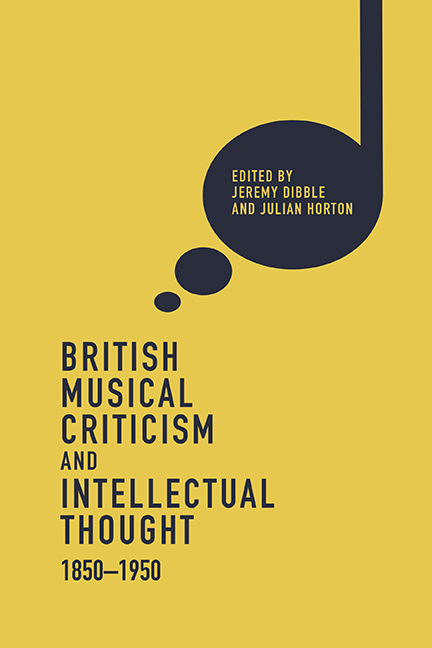Book contents
- Frontmatter
- Dedication
- Contents
- List of Illustrations
- List of Contributors
- Acknowledgements
- Introduction: Trends in British Musical Thought, 1850–1950
- 1 Avoiding ‘Coarse Invective’ and ‘Unseemly Vehemence’: English Music Criticism, 1850–1870
- 2 Spencer, Sympathy and the Oxford School of Music Criticism
- 3 Free Thought and the Musician: Ernest Walker, the ‘English Hanslick’
- 4 Ernest Newman and the Promise of Method in Biography, Criticism and History
- 5 ‘Making Symphony Articulate’: Bernard Shaw's Sense of Music History
- 6 Analysis and Value Judgement: Schumann, Bruckner and Tovey's Essays in Musical Analysis
- 7 The Scholar as Critic: Edward J. Dent
- 8 Russia and Eastern Europe
- 9 Anti-Intellectualism and the Rhetoric of ‘National Character’ in Music: The Vulgarity of Over-Refinement
- 10 Chosen Causes: Writings on Music by Bernard van Dieren, Peter Warlock and Cecil Gray
- 11 ‘Es klang so alt und war doch so neu’: Vaughan Williams, Aesthetics and History
- 12 Constant Lambert: A Critic for Today? A Commentary on Music Ho!
- 13 The Challenge to Goodwill: Herbert Howells, Alban Berg and ‘The Modern Problem’
- 14 Hans Keller: The Making of an ‘Anti-Critic’
- Select Bibliography
- Index
- Titles listed here were originally published
8 - Russia and Eastern Europe
Published online by Cambridge University Press: 17 July 2019
- Frontmatter
- Dedication
- Contents
- List of Illustrations
- List of Contributors
- Acknowledgements
- Introduction: Trends in British Musical Thought, 1850–1950
- 1 Avoiding ‘Coarse Invective’ and ‘Unseemly Vehemence’: English Music Criticism, 1850–1870
- 2 Spencer, Sympathy and the Oxford School of Music Criticism
- 3 Free Thought and the Musician: Ernest Walker, the ‘English Hanslick’
- 4 Ernest Newman and the Promise of Method in Biography, Criticism and History
- 5 ‘Making Symphony Articulate’: Bernard Shaw's Sense of Music History
- 6 Analysis and Value Judgement: Schumann, Bruckner and Tovey's Essays in Musical Analysis
- 7 The Scholar as Critic: Edward J. Dent
- 8 Russia and Eastern Europe
- 9 Anti-Intellectualism and the Rhetoric of ‘National Character’ in Music: The Vulgarity of Over-Refinement
- 10 Chosen Causes: Writings on Music by Bernard van Dieren, Peter Warlock and Cecil Gray
- 11 ‘Es klang so alt und war doch so neu’: Vaughan Williams, Aesthetics and History
- 12 Constant Lambert: A Critic for Today? A Commentary on Music Ho!
- 13 The Challenge to Goodwill: Herbert Howells, Alban Berg and ‘The Modern Problem’
- 14 Hans Keller: The Making of an ‘Anti-Critic’
- Select Bibliography
- Index
- Titles listed here were originally published
Summary
Empire and Nation
PUNCTUATED by a series of military and diplomatic conflicts and set against a background of shifting strategic alliances, the reception of Russian and Eastern European music in Britain from 1850 to 1950 vividly illustrates how geopolitical concerns can impinge upon discussion of culture and the arts. In particular, the condition and legacy of empire are at the heart of the relationship between Russia and Britain, whether in the second half of the nineteenth century, or in the first half of the twentieth. Although Russia and Britain found themselves on opposite sides of the Crimean War (1853–6), they were later to become uneasy allies in the major conflicts of the twentieth century. Even when not involved in military conflict, the ideological interaction between the two countries was shaped in the long nineteenth century by territorial rivalries in Central Asia and the Far East (what historians often refer to as the ‘Great Game’), and in the twentieth by revolutionary politics (something that would eventually give rise to the so-called ‘Cold War’).
Empire shaped the reception of the cultures of Eastern Europe too. Until 1918, many of Eastern Europe's national cultures were part of broader, multilingual and multi-ethnic entities. Poland was divided between Austria, Prussia and Russia; Bohemia, Moravia and Slovakia were subject to Austro-Hungarian rule. The South Slavonic peoples were governed either by Austro-Hungary or the Ottoman Empire, whether directly or through fealty. Even countries seldom considered part of Eastern Europe share the legacy of imperial rule. Between 1809 and 1917, Finland was a Grand Duchy of the Russian Empire, and its nineteenth- and early twentieth-century history was shaped as much by this relationship as it was by that with its Scandinavian neighbours to the west. Long subject to Ottoman rule, Greece won its independence against a backdrop of widespread European philhellenism, something that has masked its cultural affinities with other nations in the Balkans until comparatively recently.
It is this imperial framework that makes the study of the British reception of Russian and Eastern European music such a complex topic, not least because Britain – like Russia – was itself caught between imperial and national (not to say nationalist) agendas.
- Type
- Chapter
- Information
- British Musical Criticism and Intellectual Thought, 1850–1950 , pp. 174 - 198Publisher: Boydell & BrewerPrint publication year: 2018



